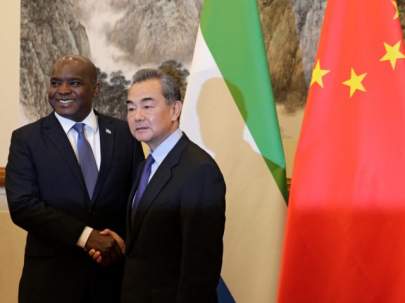Report: Sierra Leone Sells Rain Forest to World’s Worst Polluter China

The government of Sierra Leone appears to have concluded a deal this month with China to convert 250 acres of beachfront property and protected rainforest into a fishing plant and harbor.
Local and international activists condemned the deal, thus far confirmed only by vague press releases, as a “catastrophic human and ecological disaster” and a “disaster for the country and the planet.”
The government of Sierra Leone appears to have concluded a deal this month with China to convert 250 acres of beachfront property and protected rainforest into a fishing plant and harbor.
Local and international activists condemned the deal, thus far confirmed only by vague press releases, as a “catastrophic human and ecological disaster” and a “disaster for the country and the planet.”
Local landowners complained the $55 million Chinese harbor deal would destroy the rainforest and marine ecosystem as well as severely depleting fish stocks. They argued small indigenous fisherman would be wiped out by the project.
“If they do this here, the water will be dirty, there will be a lot of oil and noise, the trawlers will be all around. Our own fishermen won’t have a place to fish. Everything will be spoiled. Tourism will be finished,” former fisherman and ecotourism businessman Tito Gbandewa told the Guardian.
Legal advocacy groups have demanded to see social and environmental impact studies for the harbor project, as well as details of the “Chinese grant” that will finance construction. Lawyers said the government approved the project suddenly and without adequate public notice.
International monitors fear Chinese overfishing is depleting stocks across West Africa, capitalizing on the ineptitude and corruption of local governments.
The BBC in March reported on a Chinese fish processing plant in Gambia that utterly destroyed a vital lagoon with pollution – and was fined a paltry $25,000 by Gambian officials. Gambia also ordered the Chinese to stop dumping toxic effluent into the lagoon. Their solution was to build a pipe that dumps it into the ocean on a public beach instead. Angry locals occasionally try to destroy the pipe, but the Chinese rebuild it, with the approval of Gambia’s government. Gambia’s minister of fisheries told residents to think of the horrible stench from the pipe as the “smell of money” flowing from China into Gambia.
China built its devastating Gambian plant, and several others, by canceling about $14 million in Gambian government debt and investing $33 million in agricultural and fisheries development. The project was part of the Belt and Road Initiative (BRI), a project through which the BBC noted Beijing has become “the largest foreign financier of infrastructure development in Africa, cornering the market on most of the continent’s road, pipeline, power plant and port projects.”
China is the world’s largest producer of fish, and it has launched increasingly aggressive “aquaculture” projects as global demand for seafood increases. The United States imports about 80 percent of its seafood, much of it from China. Some of that “imported” fish is caught locally and processed in China, a situation that also exists in West Africa. As one Gambian activist complained to the BBC, China has a habit of snatching up Africa’s fish, using them to feed the stock on Chinese fish farms, and selling processed fish back to Africans at a premium.
Source: https://www.breitbart.com/national-security/2021/05/17/report-sierra-leone-sells-rain-forest-to-worlds-worst-polluter-china/




